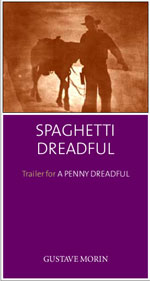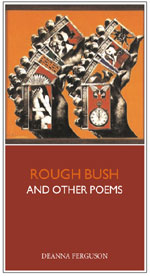 |
 |
This year's titles range from the visually sophisticated Concrete poetry of Gustave Morin, a native of Windsor who spent 10 years on his "novel" A Penny Dreadful, to an obscure volume of satirical translations of Baudelaire by the English poet Nicholas Moore, from the experiments in frame and format that Caroline Bergvall and designer Marit Muenzberg explore in their daring resetting of the poet's Eclat, to the equally daring, if entirely unscrupulous, logorrhea that is the 130 pages of another "novel," Name, by Toadex Hobogrammathon.
The big news this year might be the introduction of color into the pantheon of effects being used in our e-books: both Bergvall's Eclat and my own Alpha Betty's Chronicles rely heavily on it, in ways that would have been unsuitable to html and impossibly expensive to print in a book. Likewise, the volumes by Morin and Lytle Shaw - two of his uniquely low-tech Shark chapbooks - are primarily graphic works, while the titles by Craig Dworkin, Robert Fitterman and Larry Price attempt to re-conceptualize the page of an Adobe Acrobat file as a middle-space that ironizes the permanence of type (Dworkin's use of Courier fonts) or digital flow (Fitterman's box-like containers) as well as the "writing on the wall" soixante-huitard-style (Price's poster-style typography).
 |
Of the republications, we are happy to present the final section of Ron Silliman's The Age of Huts, The Chinese Notebook, probably the most influential of his early books outside of Kejtak, two small works by the increasingly-prized Jean Day, whose 1998 Atelos volume, The Literal World, woke so many up to her understated talents. Robert Kelly's quasi-fiction - yes, yet another "novel" - called The Cruise of the Pnyx has long been one of my favorites of his, but has never appeared in another book, nor has the original Station Hill edition of 1979 been republished.
New writers include the playwright Madelyn Kent, whose Shufu plays - part Butoh, part Richard Maxwell-like deadpan, with a touch of Clark Coolidge -- are bound to become recognized as innovative theater, and Aaron Kunin, who is becoming known in New York and elsewhere as a writer of uncommon intelligence and tremendous technical precision. The English poet Ira Lightman drops in on the series like a lightning bolt, spreading his art in a sort of spirit of personal renaissance, while Barbara Cole's Foxy Moron - a text I see as existing somewhere between poetry and drama if only because she reads it so well in public - strikes a little lower, not so much toward "renaissance" as sexual catharsis, over and over again.
Lastly, we are especially happy to have Deanna Ferguson's long-awaited follow-up collection to her 1993 book The Relative Minor (which appears as a reprint in last year's series). Several of the poems in Rough Bush have already played parts in some of the signal poetics statements of the nineties; it's good to finally have such a stash of Ferguson's recent writings in one place.
Enjoy!
[I've finally put up Bruce Andrews brief introduction to POLI SCI, his political writings. I'll put it here as well, since it's not quite properly hooked up to Arras yet.]
EMPIRE.
Excuse the deja vu.
About 30 years ago, at the start of a scholarly career in Political Science which these writings collect, I began a doctoral dissertation on U.S. imperialism. Specifically, on its most flamboyant contemporary spectacle: the U.S. war with Vietnam.
This is the war I went to graduate school in order to study — at the Johns Hopkins School of Advanced International Studies and (from ’71 to ’75) in the Ph.D. program at Harvard University.
The Nixon years, for the most part — against a backdrop of near-genocidal brutality abroad as well as turbulent dissent and soul-searching at home.
Why are we in Vietnam?
Why are we escalating or expanding the war?
Why do we refuse to withdraw?
Those were questions animating the moment.
By the early 1970s, anyone studying American foreign policy would be told: first, that the policies of the current administration would be shrouded in shadow and secrecy, open to polemic but not to scholarly grasp; and second, that from current accounts, U.S. war policy seemed ‘locked in’: still rutted in the premises that underlay the original large-scale escalations of the Johnson era, particularly those of 1964 and 1965. So, to understand the continuing imperial war, a student would need to make sense out of the earlier and massive unleashing of violence during the Johnson administration.
To figure a way out — or to imagine a possible future policy able to relinquish these imperial ambitions — involved a prescription. For policy change, if not for social change more broadly. And in the midst of protests about the present, this called for an explanation of the recent past. Not to retrace the steps that propelled the U.S. into Vietnam (a familiar preoccupation of journalists, as if chronology were explanatory), but to interpret its meaning, to grasp the point of the 1960s escalation.
To explain empire to get beyond empire. (Recent titles by my graduate supervisors were revealing: Robert W. Tucker’s Nation or Empire?, George Liska’s Imperial America, Stanley Hoffmann’s Gulliver’s Troubles, or the Setting of American Foreign Policy).
At the time (a period of raging polemic), so much of this was up for grabs:
1) Washington’s ‘official line’ (designed to justify the war) had virtually zero explanatory leverage for anyone but the true believers. [The debunking of official rhetoric had been a great triumph of the anti-war movement — with a timely assist from a new cohort of revisionist historians of American diplomacy, charting the continuities of the U.S. empire even further back than the misleading ‘origins of the Cold War’: this was an era when the ‘generation gap’ and the President’s ‘credibility gap’ with the general public were more than figures of nostalgia.];
2) scholars of international politics and foreign policy had developed a bewildering array of theories and conceptual models which had not been applied very often to current, controversial policies;
3) these disciplinary protocols in political science and IR (international relations) were embarrassingly narrow and blunted. Scholarly literatures in philosophy and social theory — able to provide a solid basis for explanation and interpretation — were still beyond the pale for the more complacently ‘policy-oriented’ afficianados of foreign affairs;
4) the vast heritage of critical theory was finally coming to light (and to translated availability) just in time to rev up the movements for social change and to make available entirely new modes of inquiry and interpretation.
Why did U.S. leaders refuse to budge?
What was the point of imperial aggression?
What was the broader foreign policy (and its plans for world order) designed to accomplish on the domestic social level?
What were the domestic sources and the domestic functions of empire?
How was I going to arrive at a place where I could say something about all of this?
Or: how to bite off more than I could chew?
To make sense out of Vietnam — and to keep faith with the dramatic (and across-the-board) radicalism and widespread push toward social change: these would be the self-serving replies to questions about what I was doing in graduate studies in political science. Asking questions and getting ready to ask questions (or, ‘getting ready to have been frightened’: to repeat a title of a poetic sequence from that time). It meant:
a) studying the ‘debate’ (between critics and apologists) over Vietnam and over U.S. hegemony and expansionism — to tease out the explanatory resonance of the arguments;
b) studying the conceptual work in I.R. and comparative foreign policy, to see how a set of competing, alternative explanations could be constructed out of it (from so-called Rational Actor models, investigations of ‘nondecision-making’, studies of bureaucratic politics or Presidential psychopathology, to the rule of public opinion and domestic pressure);
c) studying a terra incognita of work outside of political science to underprop the task of explanation (from the philosophy of science and history to Wittgensteinian linguistic philosophy and ethnomethodology, and even to the early rumblings of semiotics and structuralism shaking up the interpretive strategies in the arts and humanities);
d) finally, before this was incorporated into mainstream curricula (as it was in later decades, if only in the humanities), becoming an impassioned student (and book collector!) of critical theorizing (from Marxist political economy and Frankfurt School studies to the beginnings of post-structuralist analysis on the post-Leninist Left).
[These were, parenthetically, the years in which I became committed to a lifelong project of making radical or experimental art and to permanent residence within the (sometimes glamorized and more often demonized) intellectual Left. Looking back, without the inspiring backdrop of forceful opposition to American imperialism and the push, on the Left, of hope that a drastically different America could be imagined as well as struggled for, very little of my own effort would have turned out in the way it did. Blessing and curse: the legacy of the ‘long 1960s’, from the Kennedy assassination to Watergate.]
In 1975, I finished a doctoral dissertation on the interpretation of the U.S. escalation of the war at its most decisive period (1964 + 1965) — by laying out the conceptual building blocks of possible competing accounts of that war. Spookily, it was defended almost simultaneous with the last U.S. helicopters scrambling out of Saigon in the face of Vietnamese triumph: EMPIRE AND SOCIETY: Toward A Contextual Explanation of American Aims and Policy in Vietnam.
There seems to be no shortage these days of quickie online book reviews since the advent of poetry blogs and the evolution of the "constant critic." So perhaps this is something you've never thought you didn't want to have, but I've folded all of the "little reviews" from 1998-2002 that used to be on arras.net into a single .pdf file. They've been returned to their pristine single-run-on-paragraph form which I think is more truthful to the style of the writing (and thinking) itself. I've deleted that section of the site since it hadn't been added to in years and it was getting musty -- this is a way to just put this set behind me. There are other reviews I just never revised enough to put on the site; some of these are still scattered around the internet, catch them if you can. Arras.net, in the meantime, is going through a wacko-Jacko facelift which you'll see early next year. Click on the Big Mouth -- a giant grenadier Albatrossia pectoralis -- to download:
My last offering for this blog outside of occasional links and stuff... if you see any typos, tell me.

Photo: Serge Gavronsky
DENIS ROCHE “BOOTLEG”
An unofficial anthology of published translations of the poetry and prose of Denis Roche.
72 pp., 1MB, free
(I suggest right clicking on the above link and choosing "Save Target As" or whatever similar option, and saving the file to the disk before opening.)
TABLE OF CONTENTS
Denis Roche, An Introduction and Interview, p. 3
By Serge Gavronsky
Three Poems from Locus Solus, p. 8
Translated by John Ashbery
Eros Possessed, p. 11
Translated by Harry Mathews
Introductory Remarks From An Essay By Marcelin Pleynet:
The Aim Of Poetry Should Be . . . , p. 18
Excerpts From Denis Roche’s Preface To
Éros Énergumène: Lessons In Poetic Vacuity, p. 20
Translated by Veronica Forrest-Thomson
from Les Idées centésimales de Miss Elanize
THE ARISING OF THE INTRUDER, P. 22
MONSIEUR THE PILOT, TRULY ROYAL, P. 27
FROM LES IDÉES CENTÉSIMALES DE MISS ELANIZE, P. 36
from Éros Energumène
FROM ÉROS ENERGUMÈNE, P. 40
THEATRE FOR THE ACTIVITIES OF EROS, P. 42
Translated by Veronica Forrest-Thomson
Poem April 29 1962, p. 55
Translated by Mark Lecard
from Prose Ahead of a Woman, p. 61
Translated by Serge Gavronsky
from Le Mécrit, p. 63
STRUGGLE AND ERASURE
Translated by Pierre Joris
Selections for Poems & Texts, p. 64
Translated by Serge Gavronsky
Notes from New French Poetry: An Anthology, p. 64
By C.A. Hackett
Bibliography, p. 72
NOT FOR SALE
V.1.1
NEW YORK
REPTLLIAN NEOLETTRIST GRAPHICS, 2003
COPYRIGHTS ARE THOSE OF THE AUTHORS INVOLVED
Materials by Veronica Forrest-Thomson used courtesy Allardyce, Barnett, Publishers Allardyce, Barnett, Publishers: http://www.abar.net
In the category of "things you never thought you wanted and probably still don't want" is the following .pdf, which contains the writing I've done about Silliman's Blog and related matters over the past weeks.
I haven't put any of the comments in the file, as I have no time for serious editorial work here -- contacting authors, waiting for correx, that type of thing. Formatting this file took long enough, and it still looks like shit. You can read comments by people such as Louis Cabri, Ange Mlinko, Kevin Killian, Henry Gould, Jack Kimball, Kent Johnson, Kimberly Lyons, Robert Kelly, etc., on the right sidebar.
Of course, quotes from blogs that appear in these commentaries (or "screeds") are included. "The Secret Life of Terminals", Rachel Szekely's "libidinal" and "pared-down" reading of "Non," is not included.
This is not an effort to revive the debate; more a way of putting it behind me, us, "them," etc. and perhaps to give people who only read these quickly a chance to see if I'm really insane. Like any writer, I probably feel I've "been misunderstood," but then again I'm willing to think this all a waste of time (and a load of worthless grief) if that's the consensus.
Know what the most downloaded thingamabob on Arras.net is? Try: a .pdf of 5 translations of Anglo-Saxon poetry that I did in 1995 when I was a graduate student at the CUNY Grad Center. I never thought they were that hot, but 590 people at least looked at it in the past month. Maybe you should too:
http://www.arras.net/translations.pdf
Of course, I understand if you want to pass -- my guess is that a good 99.9% of those who downloaded it were merely trying to ace there exams -- my translations are pretty accurate representations of the text, though at one point I have Scooby Doo come flying down on a bobsled to put out the fire on King Olaf of Sweden's big toe.